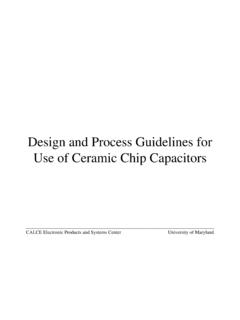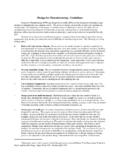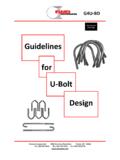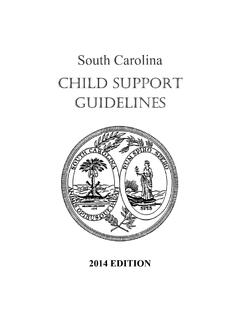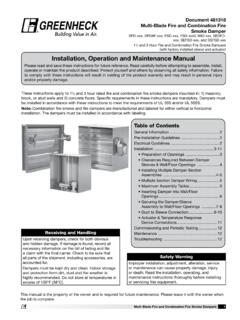Transcription of Executive Session Documentation and Guidelines
1 Executive Session Documentation and Guidelines This document provides Guidelines and procedures for implementing Executive Session discussions and the handling of related materials in accordance with the IEEE Bylaws and Policies, and Robert's Rules of Order. Implementation of these procedures is considered to be in the best interest of IEEE when conducting Executive Session discussions at meetings. Volunteers and staff involved with meeting procedures, the handling of IEEE information, and the recording and approval of minutes from these sessions should become familiar with these procedures.
2 Any questions or issues related to these procedures should be directed to Corporate Staff. The overriding procedures for Executive sessions , as approved by the IEEE Board of Directors are embodied in the (i) IEEE Bylaws, which define when Executive sessions should be used by IEEE boards and committees, who may attend, and who may have access to approved minutes, (2) Roberts Rules of Order further clarifies attendance, the recording and approval of minutes, and (iii) IEEE Policies, Section - Information Disclosure Policy, which identifies what information is considered propriety, as determined by the IEEE Board of Directors.
3 Relevant passages from those documents are provided below. IEEE Bylaw (third paragraph). Meeting Protocol. Meetings of the IEEE Board of Directors, Major Boards, and other organizational units shall be open for attendance by any IEEE member or staff. Guests (who are not members of the particular body) are not entitled to join the discussion but may be allowed to address the body at the discretion of the body. Meetings shall be convened in Executive Session when dealing with confidential matters such as, but not restricted to, individual matters, disciplinary actions, legal and business critical issues.
4 Executive sessions shall be conducted in accordance with Robert's Rules of Order (latest revision), Chapter 4, 9. Members of the Board of Directors shall be allowed to attend Executive sessions of any board or committee unless there is a conflict of interest with respect to the matter being discussed. Barring a conflict of interest, members of the Board of Directors shall be granted access to the approved minutes of Executive sessions of any organizational unit board, committee or council. Robert's Rules of Order (Latest version = 11th Edition).
5 Executive Session An Executive Session in general parliamentary usage has come to mean any meeting of a deliberative assembly , or a portion of a meeting, at which the proceedings are secret. This term originally referred to the consideration of Executive business - that is, presidential nominations to appointive offices, and treaties - behind closed doors in the United States Senate. The practice of organizations operating under the lodge system is equivalent to holding all regular meetings in Executive Session . In any society, certain matters relating to discipline (61,63), such as trials, must be handled only in Executive Session .
6 A meeting enters into Executive Session only when required by rule or established custom, or upon the adoption of a motion to do so. A motion to go into Executive Session is a question of privilege (19), and therefore is adopted by a majority vote. Whenever a meeting is being held in Executive Session , only members of the body that is meeting, special invitees, and such employees or staff members as the body or its rules may determine to be necessary are allowed to remain in the hall. Thus, in the case of a board or committee meeting being held in Executive Session , all persons whether or not they are members of the organization who are not members of the board or committee (and who are not otherwise specifically invited or entitled to attend) are excluded from the meeting.
7 A member of a society can be punished under disciplinary procedure if he violates the secrecy of an Executive Session . Anyone else permitted to be present is honor-bound not to divulge anything that occurred. The minutes, or record of proceedings, of an Executive Session must be read and acted upon only in Executive Session , unless that which would be reported in the minutes-that is, the action taken, as distinct from that which was said in debate-was not secret, or secrecy has been lifted by the assembly . When the minutes of an Executive Session must be considered for approval at an Executive Session held solely for that purpose, the brief minutes of the latter meeting are, or are assumed to be, approved by that meeting.
8 IEEE Policies Information Disclosure Policy 1. As an educational, scientific organization dedicated to the benefit of the public, IEEE recognizes and endorses the fundamental importance of transparency and accountability in all its activities. Accordingly, it is IEEE's policy to be open about its activities and to welcome and seek out opportunities to explain its work to the widest possible audience. 2. Notwithstanding the dedication to the fundamental importance of transparency IEEE also recognizes that some aspects of its operations need to be kept confidential.
9 Thus certain types of information are protected when unrestricted availability would be detrimental to its operation and/or membership. Such information includes verbal or non-verbal communication or information recorded on paper or electronically recorded. 3. When information is recorded in a document embodied in a medium that can be stored, read and or transmitted, such media including but being not limited to paper or electronic media, IEEE has defined two levels of classification for documents that should be restricted to the IEEE community.
10 These classifications include: Proprietary. The classification Proprietary shall be applied to documents available to members of IEEE and IEEE staff. Confidential. The classification Confidential shall be applied to documents whose distribution to authorized volunteer leaders* and IEEE staff on a need to know basis. Within this classification any documents that are to be limited to stricter controls on distribution, shall be classified as Confidential Controlled Distribution . The treatment of information that is subject to attorney-client privilege is governed by statutory and judicial pronouncements and, therefore, not addressed, regulated or administered by this policy.
